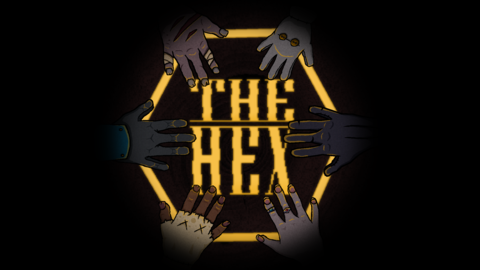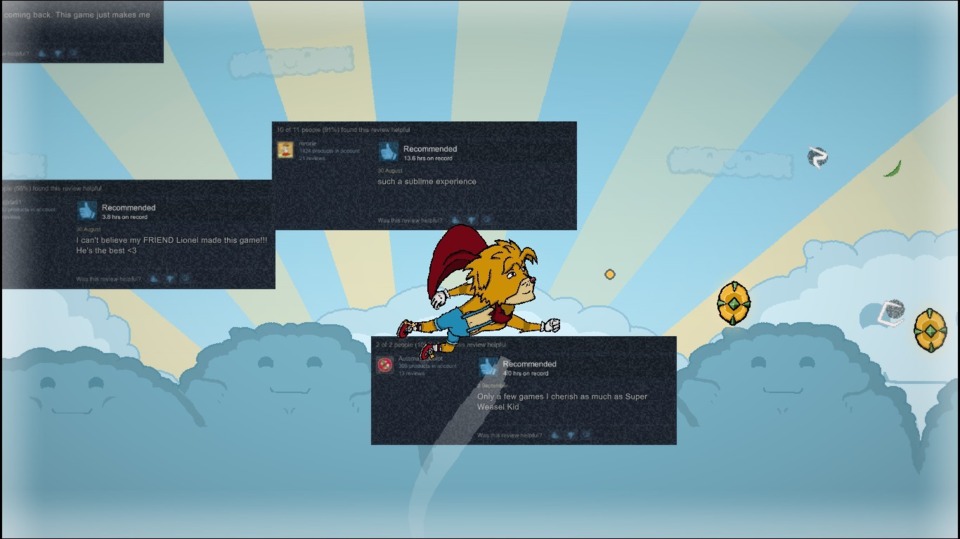Indie Game of the Week 163: The Hex
By Mento 0 Comments

It's been a while since I last visited Daniel Mullins Games with Pony Island (IGotW #10) and after playing his most recent game, 2018's The Hex, I have to wonder how draughty that dude's house is with every fourth wall missing. As in Pony Island, The Hex is predominantly a game about creating video games, and an imagined tumultuous relationship between a creator and his creations, with the player caught in the middle like a bystander awkwardly watching a married couple bicker. Opening up on a creaky, crumbling tavern where a selection of has-been video game characters are drinking away their woes, the elderly proprietor gets a phone call warning them that one of the patrons is planning to murder someone later that evening. With this central mystery, the player bounces from one patron to another, reliving their glory days and downfalls via flashbacks that each pertain to a different video game genre (platformers, fighters, turn-based RPGs, etc.), and moving the central mystery along while creating no end of additional threads that weave in and out of everyone's backstories. The games of this world are all created by a central "The Gameworks" utility, a stand-in for the Unity engine (which was used to make this game), and each character runs afoul of the administration of this toolset in turn, becoming blacklisted or corrupted in the process. It's the universe of Wreck-It Ralph reimagined as an oppressive system where bootlickers succeed and dissidents are punished with dissatisfying genre transfers, exile, or worse.
I really enjoyed the layered plot of the game, its deep dives into each character's interiority, and the hints - later made overt with a deliciously knowing self-centered "developer's commentary" during the game's inevitable "walking simulator" chapter - of the type of noxious, short-sighted, and arrogant personality behind their creation. It's definitely a game like Fez or Undertale or, indeed, Pony Island where the developers have hidden lots of secrets and "forbidden knowledge" in the margins of the game's code, and reading the achievement list (which I'd recommend waiting to do until after completing game, just for the sheer amount of "I could've done that?!") gives you a clear sense of how much the developers were hoping meticulous players would take the time to find and later disseminate what they'd learned. If you've played any ARG-heavy video game with an elaborate "mythos", The Hex is very much wading through those same Byzantine waters.
However, as might reasonably be expected given the amount of genre-crossing going on, The Hex falters most when it actually has to be a video game. Most of the time the gameplay is perfunctory but unexceptional - the goal for each chapter's chosen genre visit isn't so much to provide a mechanically rich experience, given that it'll only persist until the story moves onto something else - but will occasionally demonstrate bursts of meta brilliance. An example of the latter would be the Waste World chapter, where the game becomes something like a Fallout or The Banner Saga tactical RPG, except the in-universe lore is that this game was never completed by its procrastinating, resources-light developer and was finished with the help of community mod support, which drops the quality of the writing immensely, disrupts the continuity, and introduces a cheat engine that the player can use to give their units infinite movement or damage. It's a chaotic chapter where the gameplay and story (or rather, the overarching meta story, as opposed to Waste World's story) are in perfect unison.
Then there are the more action-oriented cases like the dull platformer Super Weasel World or the awful shooter Vicious Galaxy, the latter of which was literally broken for me and necessitated skipping ahead using a built-in chapter select feature. (It's another case of the Unity engine not working properly on weaker systems, which seems to happen more frequently these days: not only does this produce lag and create visual glitches, but the programming itself appears to mutate and generate warped scenarios the developer never intended. Given how the narrative frequently deals with glitchy, incomplete, or unoptimized games-within-a-game, it was kinda difficult to parse which of these issues were on purpose.)

If I was forced to liken this game to another, it'd be last year's Horace from Paul Helman and Sean Scaplehorn. Horace had a wonderfully deep storyline and frequently crossed genre barriers for an unpredictable free-flow narrative that could lurch into a new side-plot or flight of fancy at any given moment, and was also somewhat let down by the parts where it was supposed to be a video game with a lack of optimization that made it a real challenge to progress through at times. Despite my frustration with both, I feel inclined to let them off the hook for the ambitious stories they're trying to tell. In both cases I persevered because I wanted to see where they would go next and how everything would shake out.
It isn't without its problems, but if you played Pony Island and were bowled over (in a good way) with some of the decisions it made and the ideas it explored, The Hex is every bit a worthy follow-up. The frequent genre switches can make for an uneven experience, and if you really struggled with Pony Island's "coding puzzles" expect more of those here too, but I'm honestly glad that games like this continue to explore what it means to make games and the responsibilities and obligations, if any, a successful developer has to their fanbase (and to their own characters, for that matter). And even if meta "media about making that kind of media" stories are a little too self-indulgent a topic for your liking, the game's twists, intrigue, dark sense of humor, and flashes of inspired game design should be sufficient incentive instead.
Rating: 4 out of 5.
| < Back to 162: A Short Hike | The First 100 | > Forward to 164: Shiness: The Lightning Kingdom |
